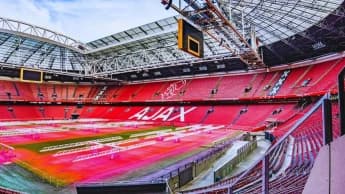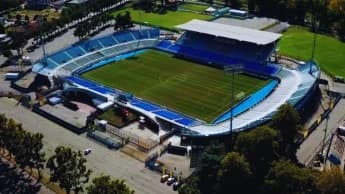
Discover Andrea Pirlo's remarkable journey from a youth prospect in Italy to an iconic footballer, celebrating his influential style, triumphs, and enduring legacy in the sport.
Andrea Pirlo, born on May 19, 1979, in Flero, Italy, stands as a monumental figure in the history of football. Celebrated for his graceful playing style, he embodied elegance, intelligence, and technical brilliance on the pitch. Pirlo's extraordinary skills as a midfielder garnered him worldwide acclaim as one of the greatest players of all time. His abilities were characterized by unmatched vision, precise passing, and his creativity in set-pieces, especially free kicks.
Pirlo's impact went well beyond his personal achievements; he transformed the position of the deep-lying playmaker. Known as 'The Architect,' he skillfully directed the tempo of the game with his calm demeanor and exceptional spatial awareness, turning football matches into showcases of his creative talent.
His journey commenced at Brescia's youth academy, where his extraordinary talent led him to make his debut at the age of just 16. Following that, he faced tough periods at Inter Milan and Reggina before truly coming into his own at AC Milan. During a decade spent with Milan, Pirlo became a pivotal figure in their midfield, playing a key role in securing two UEFA Champions League titles and an array of domestic trophies. Subsequently, his transfer to Juventus revitalized his career, guiding the Turin giants to four successive Serie A titles and a revival on the European front.
On the international stage, Pirlo was a key player for the Italian national team. His greatest accomplishment came in 2006 when he played a crucial role in Italy’s victory at the FIFA World Cup. His exceptional performances throughout the tournament earned him a spot in the Team of the Tournament and the Bronze Ball award. Additionally, he led Italy to the final of UEFA Euro 2012 and participated in various other international competitions, leaving a lasting legacy with 116 caps and 13 goals.
Pirlo concluded his playing career in 2017, following a short stint with New York City FC in Major League Soccer. After his retirement, he transitioned into coaching, starting with Juventus and moving on to manage other clubs in Italy, displaying his footballing acumen in this new role.
The legacy of Andrea Pirlo is characterized by creativity, perseverance, and a lasting influence on the perception and playing of football. His name has become emblematic of the sport's grace and charm.
Key Career Achievements
The milestones in Andrea Pirlo's career underscore his evolution from a young talent to a legendary figure in football. He made his professional debut for Brescia in 1995, quickly demonstrating his exceptional skills, which contributed to the team’s Serie B victory in 1997 and subsequent promotion to Serie A. In his formative years, he transferred to Inter Milan in 1998, but it was during his loan at Reggina and later return to Brescia in 2001 that crucial changes occurred. At Brescia, under the influence of Roberto Baggio, Pirlo emerged as a deep-lying playmaker, transforming both his career trajectory and the tactical approach in football.
Andrea Pirlo’s move to AC Milan in 2001 signified the start of an illustrious chapter in his career. Throughout his ten years with the club, he secured two Serie A championships and two UEFA Champions League titles in 2003 and 2007. His displays during these seasons were exceptional, showcasing his ability to control and direct Milan’s midfield during their era of European supremacy. Additionally, Pirlo achieved success in two UEFA Super Cups, a FIFA Club World Cup, a Coppa Italia, and a Supercoppa Italiana, solidifying his status as one of the most celebrated players in the history of AC Milan.
In 2011, Pirlo made a pivotal move to Juventus, a transfer that sparked skepticism regarding his capacity to maintain top-level performance. However, he proved his critics wrong by guiding the Turin club to four successive Serie A titles. His exceptional vision, accurate passing, and leadership revitalized Juventus, transforming them into a dominant force in Italian football. During his tenure, he also secured an additional Coppa Italia and two Supercoppa Italiana titles. Pirlo’s grace on the field earned him numerous individual accolades, including the Serie A Footballer of the Year award and multiple selections for the Serie A Team of the Year.
Pirlo's accomplishments on the international stage are equally remarkable. He played a pivotal role in Italy’s victory at the 2006 FIFA World Cup, showcasing exceptional performances throughout the tournament, highlighted by his Man of the Match recognition in the final against France. Additionally, he was a key factor in Italy's journey to the UEFA Euro 2012 final, where his authoritative presence and panenka penalty during the quarter-final against England became legendary. Throughout his career, Pirlo represented Italy in numerous tournaments, including four World Cups and three European Championships, amassing 116 caps and netting 13 goals for his country.
As he approached the end of his playing days, Pirlo joined New York City FC in Major League Soccer in 2015, where he continued to showcase his exceptional technical abilities until his retirement in 2017. After hanging up his boots, Pirlo made the transition to management, beginning with Juventus and subsequently overseeing other clubs, thereby enriching the sport with his tactical acumen. These achievements not only highlight Pirlo’s remarkable career but also emphasize his lasting influence on the game.
Personal Honors
Andrea Pirlo, celebrated for his exceptional skills and insight on the pitch, received a multitude of awards that cemented his status as one of the finest midfielders in football history. What follows is a comprehensive overview of his individual accolades and recognitions:
Pirlo's remarkable collection of honors highlights his significance not only within Italy but also on the international stage, showcasing his exceptional talent, leadership qualities, and lasting effect on the world of football.
Statistics
Andrea Pirlo's remarkable career encompasses several clubs and international tournaments. Throughout his 22 years as a professional footballer, Pirlo participated in 570 club matches, netting 61 goals. The majority of his career was spent in Serie A, where he excelled at Brescia, Inter Milan, AC Milan, and Juventus, before wrapping up his playing career with New York City FC in Major League Soccer.
Andrea Pirlo earned 116 caps for Italy, scoring 13 goals throughout his international career. Notable highlights include his vital role in Italy's triumph at the 2006 FIFA World Cup, where he delivered three Man of the Match performances, and his contribution to Italy reaching the UEFA Euro 2012 final. Pirlo was renowned for his exceptional precision in set-pieces, successfully converting many free-kicks and penalties during his playing days.
Category
Statistical Value
Total Club Appearances
570
Total Club Goals
61
International Appearances (Italy)
116
Goals Scored for the National Team
13
Significant Accomplishments
Winner of the 2006 FIFA World Cup and finalist in UEFA Euro 2012
Club Achievements
2 UEFA Champions League titles, 6 Serie A championships, 1 MLS All-Star selection
Awards and Honors
Selected in the FIFPro World XI (2006), named Serie A Footballer of the Year three times, and included in the UEFA Team of the Year (2012).
Resilience and Comebacks
Andrea Pirlo's football career is characterized not only by his achievements but also by his resilience and adaptability in the face of challenges. These instances of determination reinforce his reputation as one of the most respected athletes in the sport.
Pirlo’s early transfer to Inter Milan in 1998 presented numerous obstacles. Despite his evident talent, he found it difficult to secure playing time due to the club's abundance of attacking players and various tactical mismatches. This led to subsequent loan spells at Reggina and Brescia, where Pirlo began to reveal his potential. At Brescia, under the guidance of Carlo Mazzone, he was transformed into a deep-lying playmaker, marking a crucial turning point in his career that reinvigorated his path.
The move to AC Milan in 2001 was a turning point in Pirlo's career. He thrived in his new position, orchestrating the team's play from midfield and guiding the Rossoneri to both domestic and European triumphs. This era demonstrated his capacity to adapt and make the most of his abilities when integrated into the ideal system.
In 2011, AC Milan deemed Pirlo unnecessary, which led to his transfer to their rivals Juventus without any transfer fee. Rather than marking the end of his career, this transition sparked a remarkable resurgence. Pirlo emerged as the key figure in Juventus’ midfield, playing a pivotal role in securing four consecutive Serie A titles and re-establishing himself as one of the top playmakers globally.
Pirlo's resilience was prominently displayed during Italy's campaign in the 2006 FIFA World Cup. His performances throughout the tournament, especially in the high-pressure final against France, highlighted his composure and exceptional ability to thrive under intense scrutiny. Despite facing numerous challenges, Pirlo distinguished himself as one of the tournament's key players, ultimately receiving the Bronze Ball award.
Making the move to Major League Soccer with New York City FC in 2015 brought new challenges for Pirlo as he adjusted to a different style of play and a new environment. Although his physical pace had diminished, his exceptional understanding of the game and passing ability kept him as a crucial figure, aiding in the development of soccer in the United States.
Throughout his career, Pirlo exhibited an exceptional ability to face challenges with poise and come back even stronger, which became a defining aspect of his legacy. His flexibility, strategic acumen, and unwavering resolve allowed him to excel amid evolving roles, clubs, and obstacles, establishing him as a lasting symbol of resilience in the world of football.
Heritage
Andrea Pirlo’s legacy goes beyond his impressive accomplishments on the field, embodying a distinctive combination of elegance, intelligence, and creativity that few athletes in football history have achieved. Celebrated as one of the finest midfielders in history, Pirlo transformed the role of the deep-lying playmaker, infusing an artistic flair into a position typically linked to defensive responsibilities. His aptitude for controlling the rhythm of games, executing remarkable passes, and delivering exquisite free kicks propelled him to legendary status.
Pirlo's impact goes far beyond his awards and honors; he served as an inspiration for a new generation of midfielders and coaches, who viewed him as the standard of football elegance. He was a player who flourished under pressure, exemplified by his pivotal performances in the 2006 FIFA World Cup and his bold Panenka penalty against England during UEFA Euro 2012, demonstrating a serenity that contrasted with the significance of the moments.
His poise on the pitch transformed him into a cultural icon, garnering respect not just for his technical skills but also for his character and leadership qualities. Pirlo's ability to merge tactical acumen with seamless execution set a standard for budding playmakers worldwide. His induction into the Italian Football Hall of Fame, along with numerous selections in FIFA and UEFA's annual teams of the year, highlight his lasting influence on the game.
Even after retiring from playing, Pirlo's legacy continues to unfold. As a manager, he upholds his philosophy and vision, sharing the wisdom and elegance that characterized his playing days. Andrea Pirlo remains a symbol of football artistry and a figure whose impact will echo through generations.
Future Perspectives
Although Pirlo hung up his boots in 2017, he has embarked on a new journey in management, facing fresh challenges. Having taken the helm at Juventus and Sampdoria, he is steadily establishing himself as a tactician. While his coaching career is still in its nascent phase, his profound knowledge of the game marks him as a promising presence in the managerial landscape.
Andrea Pirlo's journey, which began as a precocious talent in Flero and evolved into that of a footballing legend, exemplifies his dedication, versatility, and skill. His enduring legacy is destined to motivate future generations.





